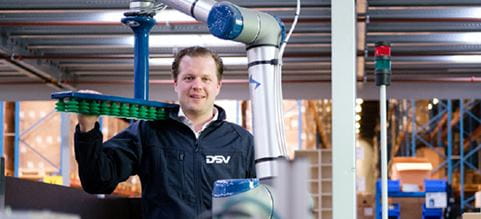DSV researches with Smart Robotics and TU Eindhoven
Robots will never completely replace the people in the DSV warehouses. But they can take over the physically demanding, repetitive tasks of our people.

Robots will never completely replace the people in the DSV warehouses. “But they can take over the physically demanding, repetitive tasks of our people. This makes robots a part of the solution to the increasing scarcity on the labor market, " says Erik van Wunnik. The product development director of DSV Solutions sketches a picture of the future in which robots work with people during the opening hours of a warehouse. If they close the door behind them in the evening, the robots will continue to work alone. “They can then carry out preparatory work for the next day and possibly start with order picking. Maybe at a faster pace because safety is no longer an issue. "
The robots Van Wunnik talks about are "collaborative robots", in short called cobots. They form a new generation of robots that do not have to stay behind security gates, but can move between people and even work with them. At the end of 2018, DSV conducted a first test in Moerdijk with a cobot from Smart Robotics. “We have seen that the cobot is very good at a specific task. Think of moving boxes of 30 x 30 x 30 centimeters from A to B. But in logistics the variation in products, positions and tasks is much greater, "says Alex van der Plas, product trainee management. Van Wunnik:
That is why we are starting this research project. We are going to investigate how we can use cobots as flexibly as possible in a dynamic logistics environment.
Universal control
In addition to DSV, two more partners are participating in the project entitled "Universally applicable cobots; tomorrow's colleagues. " The first partner is Smart Robotics, which again supplies the cobots and contributes the knowledge about programming those cobots. The second partner is Eindhoven University of Technology, which in the past has already developed algorithms for care robots that can respond dynamically to the environment. “We want to apply those algorithms to cobots in a warehouse. The goal is to develop a universal control of cobots in combination with smart, flexible grippers and a user-friendly control. If we succeed, we can allow cobots to work flexibly with human colleagues. "
These grippers are one of the first issues to be addressed. A gripper based on vacuum technology may suffice for many products, but that does not apply to all products. How does a cobot recognize for which product which gripper is needed? Another issue is the user interface: what should it look like so that human colleagues can easily operate the cobots? “But the biggest challenge is the mobility of the cobots. What will be better soon: bring the robot to the goods or the goods to the robot? To be able to find an answer to that, we first have to answer those other issues, "says Van der Plas.
Future investments
The outcome of the research is a determining factor for DSV's future investments in robot technology. “Cobots have been used for a long time in production companies. But the circumstances at a logistics service provider such as DSV are different. We have warehouses with different customers, changing stock packages and a large diversity in products and processes. When we purchase robots, we want to be sure that we can use them as widely as possible. This research project leads to the strengthening and broadening of the foundations on which we can build a business case for investment in cobots. ”
DSV is setting up a test lab for the project. Testing is carried out there with, among other things, shoes and clothing that form the product group with the largest volume for DSV. "If we can successfully deploy the cobots there, there is a good chance that we have a balanced business case," says Van Wunnik, who adds that the project receives a subsidy from OPZuid, the innovation program for the Southern Netherlands that was set up with support from the European Regional Development Fund. The duration of the project is three years. “Amazon recently stated that robots will not replace the people in their warehouses in the next ten years. I don't think so either, but the developments are going fast. I am convinced that we will encounter cobots in our warehouses within two to three years. "
Any questions?
Contact Erwin Peeters, our press contact.

